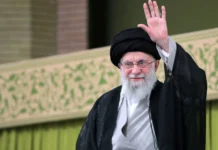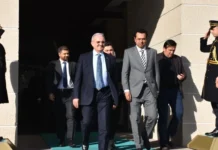UNITED NATIONS, April 29 (Alliance News): Pakistan has called on the United Nations Security Council (UNSC) to take decisive action to prevent new conflicts, resolve protracted ones, and promote the peaceful settlement of disputes in accordance with international law, in an effort to address the growing global displacement crisis.
In his briefing to the 15-member Council, Ambassador Asim Iftikhar Ahmad, Pakistan’s Permanent Representative to the UN, stressed the urgent need for a fundamental rethink. He described the crisis, which has left over 120 million people forcibly displaced worldwide, as reaching “catastrophic proportions.”
“Forced displacement must be categorically rejected,” said Ambassador Asim, urging a shift in the international community’s approach to the issue.
UN High Commissioner for Refugees (UNHCR), Filippo Grandi, who also addressed the Council, condemned the destruction of thousands of lives in pursuit of supremacy.
He pointed out that international humanitarian law had been “dismissed” in many global conflicts, including those in Sudan, Ukraine, Myanmar, the Democratic Republic of the Congo, and Haiti. Grandi stated, “Violence has become the currency of our age,” with forcibly displaced individuals being among the first victims of war.
Ambassador Asim highlighted the need for operationalizing the principle of equitable burden- and responsibility-sharing. He called for timely humanitarian and development support for refugee-hosting countries, delivered through grants, and for increased financial contributions to UNHCR from donor nations.
“We call on developed countries to establish multi-year resettlement plans with fixed quotas, ensuring that resettlement processes are efficient, predictable, and inclusive,” he added.
The Pakistani envoy also stressed the importance of prioritizing voluntary repatriation and sustainable reintegration for refugees, with fully funded programs and greater development aid to countries of origin. He advocated for investments in critical infrastructure to create conditions for safe, dignified returns.
He further noted that developing countries, despite facing their own socio-economic challenges, continue to bear the greatest burden of hosting refugees. Meanwhile, developed nations, with far greater resources, have increasingly turned inward. “Physical and political barriers have been erected, closing doors to those most in need,” Ambassador Asim said.
Pakistan, which has a longstanding tradition of compassion and hospitality, has hosted millions of Afghan refugees over the years, despite economic and security challenges.
The country continues to provide shelter, protection, and opportunities to Afghan refugees while facilitating their resettlement to third countries.
Ambassador Asim also pointed out the plight of displaced individuals from Palestine, Syria, Yemen, and other conflict zones, who are still waiting for conditions that would allow for their voluntary, safe, and dignified return.
The ongoing conflict in Sudan has displaced millions, both internally and beyond the country’s borders. Ambassador Asim emphasized the urgent need for efforts to end the violence and ensure humanitarian access and assistance.
“Elsewhere, crises across Africa, Latin America, the Sahel, and Europe further exacerbate the global displacement challenge,” he added.
Ambassador Asim concluded by stressing that developing countries host 85% of the world’s refugees, while many developed countries continue to shrink asylum spaces, tighten immigration policies, and reduce resettlement quotas. He described this as “burden-shifting, not burden-sharing.”
Pakistan believes that the path forward is clear: the primary drivers of displacement—unresolved conflicts, foreign occupations, and the systematic denial of rights—must be addressed through the collective will and effective action of the UNSC and the international community.
“This duty is not merely a political obligation; it is a moral imperative that is deeply rooted in human history,” Ambassador Asim emphasized, adding that it is also an Islamic tradition.
“As we confront today’s global refugee crisis, let us be guided and inspired by the exemplary responses from history based on acceptance, not rejection, hope, not indifference, and bridges of humanity, not walls,” the Pakistani envoy concluded.






